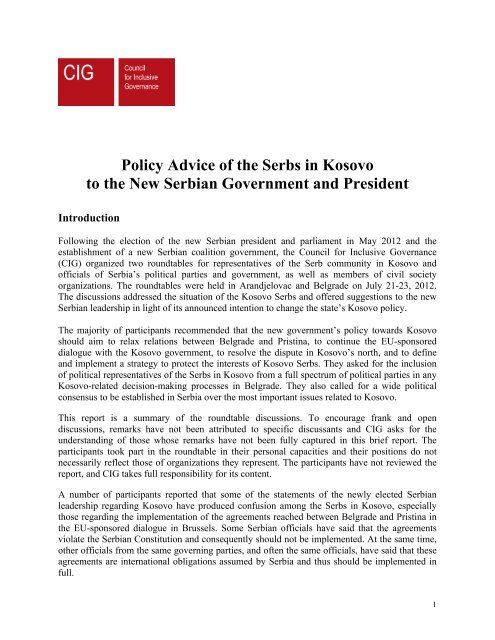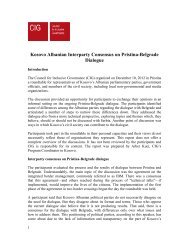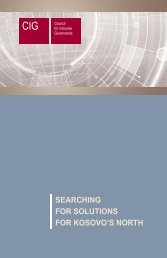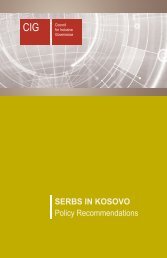Policy Advice of the Serbs in Kosovo to the New ... - Cigonline.net
Policy Advice of the Serbs in Kosovo to the New ... - Cigonline.net
Policy Advice of the Serbs in Kosovo to the New ... - Cigonline.net
You also want an ePaper? Increase the reach of your titles
YUMPU automatically turns print PDFs into web optimized ePapers that Google loves.
<strong>Policy</strong> <strong>Advice</strong> <strong>of</strong> <strong>the</strong> <strong>Serbs</strong> <strong>in</strong> <strong>Kosovo</strong><br />
<strong>to</strong> <strong>the</strong> <strong>New</strong> Serbian Government and President<br />
Introduction<br />
Follow<strong>in</strong>g <strong>the</strong> election <strong>of</strong> <strong>the</strong> new Serbian president and parliament <strong>in</strong> May 2012 and <strong>the</strong><br />
establishment <strong>of</strong> a new Serbian coalition government, <strong>the</strong> Council for Inclusive Governance<br />
(CIG) organized two roundtables for representatives <strong>of</strong> <strong>the</strong> Serb community <strong>in</strong> <strong>Kosovo</strong> and<br />
<strong>of</strong>ficials <strong>of</strong> Serbia’s political parties and government, as well as members <strong>of</strong> civil society<br />
organizations. The roundtables were held <strong>in</strong> Arandjelovac and Belgrade on July 21-23, 2012.<br />
The discussions addressed <strong>the</strong> situation <strong>of</strong> <strong>the</strong> <strong>Kosovo</strong> <strong>Serbs</strong> and <strong>of</strong>fered suggestions <strong>to</strong> <strong>the</strong> new<br />
Serbian leadership <strong>in</strong> light <strong>of</strong> its announced <strong>in</strong>tention <strong>to</strong> change <strong>the</strong> state’s <strong>Kosovo</strong> policy.<br />
The majority <strong>of</strong> participants recommended that <strong>the</strong> new government’s policy <strong>to</strong>wards <strong>Kosovo</strong><br />
should aim <strong>to</strong> relax relations between Belgrade and Prist<strong>in</strong>a, <strong>to</strong> cont<strong>in</strong>ue <strong>the</strong> EU-sponsored<br />
dialogue with <strong>the</strong> <strong>Kosovo</strong> government, <strong>to</strong> resolve <strong>the</strong> dispute <strong>in</strong> <strong>Kosovo</strong>’s north, and <strong>to</strong> def<strong>in</strong>e<br />
and implement a strategy <strong>to</strong> protect <strong>the</strong> <strong>in</strong>terests <strong>of</strong> <strong>Kosovo</strong> <strong>Serbs</strong>. They asked for <strong>the</strong> <strong>in</strong>clusion<br />
<strong>of</strong> political representatives <strong>of</strong> <strong>the</strong> <strong>Serbs</strong> <strong>in</strong> <strong>Kosovo</strong> from a full spectrum <strong>of</strong> political parties <strong>in</strong> any<br />
<strong>Kosovo</strong>-related decision-mak<strong>in</strong>g processes <strong>in</strong> Belgrade. They also called for a wide political<br />
consensus <strong>to</strong> be established <strong>in</strong> Serbia over <strong>the</strong> most important issues related <strong>to</strong> <strong>Kosovo</strong>.<br />
This report is a summary <strong>of</strong> <strong>the</strong> roundtable discussions. To encourage frank and open<br />
discussions, remarks have not been attributed <strong>to</strong> specific discussants and CIG asks for <strong>the</strong><br />
understand<strong>in</strong>g <strong>of</strong> those whose remarks have not been fully captured <strong>in</strong> this brief report. The<br />
participants <strong>to</strong>ok part <strong>in</strong> <strong>the</strong> roundtable <strong>in</strong> <strong>the</strong>ir personal capacities and <strong>the</strong>ir positions do not<br />
necessarily reflect those <strong>of</strong> organizations <strong>the</strong>y represent. The participants have not reviewed <strong>the</strong><br />
report, and CIG takes full responsibility for its content.<br />
A number <strong>of</strong> participants reported that some <strong>of</strong> <strong>the</strong> statements <strong>of</strong> <strong>the</strong> newly elected Serbian<br />
leadership regard<strong>in</strong>g <strong>Kosovo</strong> have produced confusion among <strong>the</strong> <strong>Serbs</strong> <strong>in</strong> <strong>Kosovo</strong>, especially<br />
those regard<strong>in</strong>g <strong>the</strong> implementation <strong>of</strong> <strong>the</strong> agreements reached between Belgrade and Prist<strong>in</strong>a <strong>in</strong><br />
<strong>the</strong> EU-sponsored dialogue <strong>in</strong> Brussels. Some Serbian <strong>of</strong>ficials have said that <strong>the</strong> agreements<br />
violate <strong>the</strong> Serbian Constitution and consequently should not be implemented. At <strong>the</strong> same time,<br />
o<strong>the</strong>r <strong>of</strong>ficials from <strong>the</strong> same govern<strong>in</strong>g parties, and <strong>of</strong>ten <strong>the</strong> same <strong>of</strong>ficials, have said that <strong>the</strong>se<br />
agreements are <strong>in</strong>ternational obligations assumed by Serbia and thus should be implemented <strong>in</strong><br />
full.<br />
1
Discussion Summary<br />
The participants differed on <strong>the</strong> implementation <strong>of</strong> <strong>the</strong> agreements. Some said that <strong>the</strong><br />
agreements should not be implemented, or at least not <strong>in</strong> <strong>Kosovo</strong>’s north. O<strong>the</strong>rs, mostly from<br />
<strong>the</strong> south, said that selective implementation is dangerous for <strong>the</strong> more vulnerable part <strong>of</strong> <strong>the</strong><br />
Serb community <strong>in</strong> <strong>the</strong> south. Selective implementation could harm <strong>the</strong> <strong>in</strong>terests <strong>of</strong> <strong>the</strong> <strong>Serbs</strong> <strong>in</strong><br />
<strong>the</strong> south and deepen <strong>the</strong> division between <strong>the</strong> <strong>Serbs</strong> <strong>in</strong> <strong>the</strong> north and those <strong>in</strong> <strong>the</strong> south.<br />
Regardless <strong>of</strong> <strong>the</strong>ir differ<strong>in</strong>g views, <strong>the</strong> majority <strong>of</strong> <strong>the</strong> participants believed Serbia had little<br />
choice but <strong>to</strong> implement <strong>the</strong> agreements <strong>in</strong> full before <strong>the</strong> end <strong>of</strong> <strong>the</strong> year, when EU is expected<br />
<strong>to</strong> make a decision on <strong>the</strong> date for start<strong>in</strong>g negotiations for Serbia’s EU accession.<br />
Some participants said that <strong>the</strong> government will try <strong>to</strong> take a number <strong>of</strong> steps <strong>to</strong> improve its<br />
<strong>in</strong>ternational image and reputation, but that <strong>the</strong>se steps will be small. “It is <strong>to</strong>o risky politically<br />
for <strong>the</strong> new government <strong>to</strong> take big steps,” one <strong>of</strong> <strong>the</strong>m said. Many predicted that <strong>the</strong> new<br />
government would implement <strong>the</strong> agreements and also cont<strong>in</strong>ue <strong>the</strong> dialogue with <strong>the</strong> aim <strong>of</strong><br />
reach<strong>in</strong>g new agreements on telecommunications and energy.<br />
The Serbian <strong>in</strong>stitutions <strong>in</strong> <strong>Kosovo</strong>—also known as parallel <strong>in</strong>stitutions—are expected <strong>to</strong> be <strong>the</strong><br />
most contentions issue between Belgrade and Prist<strong>in</strong>a and between Belgrade and <strong>the</strong><br />
<strong>in</strong>ternational community. Some said that this could become a formal EU condition for Serbia for<br />
obta<strong>in</strong><strong>in</strong>g <strong>the</strong> date for start<strong>in</strong>g negotiations for EU membership. A decision that needs a more<br />
urgent resolution regards <strong>the</strong> two local assemblies that came out <strong>of</strong> <strong>the</strong> recent Serbian local<br />
elections <strong>in</strong> <strong>the</strong> municipalities <strong>of</strong> Zvecan and Zub<strong>in</strong> Po<strong>to</strong>k <strong>in</strong> <strong>the</strong> north, an election that did not<br />
have <strong>the</strong> approval <strong>of</strong> Belgrade. Some participants said that <strong>the</strong> new government would have <strong>to</strong><br />
close down Serbian political and security <strong>in</strong>stitutions <strong>in</strong> <strong>the</strong> north such as police, courts, and later<br />
<strong>the</strong> local adm<strong>in</strong>istrations <strong>in</strong>clud<strong>in</strong>g <strong>the</strong> local assemblies. They predicted <strong>the</strong>se <strong>in</strong>stitutions would<br />
be closed with<strong>in</strong> <strong>the</strong> next six months under <strong>the</strong> pressure from <strong>the</strong> <strong>in</strong>ternational community.<br />
Many asserted that f<strong>in</strong>d<strong>in</strong>g a solution for <strong>the</strong> north that satisfies all parties—Prist<strong>in</strong>a, <strong>Kosovo</strong><br />
<strong>Serbs</strong>, Belgrade, and <strong>the</strong> <strong>in</strong>ternational community—would be difficult. Talks only between<br />
Prist<strong>in</strong>a and <strong>Kosovo</strong> <strong>Serbs</strong> <strong>in</strong> <strong>the</strong> north would not produce any results ei<strong>the</strong>r. Belgrade is a<br />
necessary <strong>in</strong>terlocu<strong>to</strong>r. In fact, Belgrade should be <strong>the</strong> counterpart <strong>in</strong> this dialogue and take <strong>the</strong><br />
ma<strong>in</strong> responsibility for reach<strong>in</strong>g a solution. The <strong>Kosovo</strong> <strong>Serbs</strong>, however, should be part <strong>of</strong> this<br />
dialogue s<strong>in</strong>ce <strong>the</strong>y will be at <strong>the</strong> receiv<strong>in</strong>g end <strong>of</strong> <strong>the</strong> potential agreements, <strong>the</strong> majority <strong>of</strong> <strong>the</strong><br />
participants said.<br />
The <strong>Kosovo</strong> <strong>Serbs</strong> recommended that <strong>the</strong> new government should engage <strong>the</strong>m more <strong>in</strong> <strong>the</strong><br />
debate on <strong>Kosovo</strong>. They also said that <strong>the</strong>ir own political and civil society representatives should<br />
be more active and blunt <strong>in</strong> tell<strong>in</strong>g Belgrade what <strong>the</strong>y expect and want from it. A number <strong>of</strong><br />
participants predicted that <strong>the</strong> new government would be more cooperative on <strong>Kosovo</strong> than <strong>the</strong><br />
old government, po<strong>in</strong>t<strong>in</strong>g out <strong>to</strong> President Tomislav Nikolic’s <strong>in</strong>itiative <strong>to</strong> reach an <strong>in</strong>terparty<br />
consensus on <strong>the</strong> <strong>Kosovo</strong>’s issue with<strong>in</strong> <strong>the</strong> Serbian parliament. They suggested that <strong>the</strong><br />
president should come up with his proposal for such a consensus as soon as possible. “The<br />
Serbian government needs <strong>to</strong> have a concept about what its <strong>Kosovo</strong> policy should be and reach a<br />
2
consensus on it.” Politics <strong>to</strong>wards <strong>Kosovo</strong> cannot be on <strong>the</strong> basis <strong>of</strong> conditions exist or<br />
conditions do not exist—a strategy <strong>of</strong> <strong>the</strong> previous government.<br />
Some said that Serbian parliamentary parties, except for <strong>the</strong> Liberal Democratic Party, do have a<br />
consensus on <strong>Kosovo</strong>, namely that noth<strong>in</strong>g outside <strong>the</strong> Serbian constitution should be accepted,<br />
thus <strong>the</strong> constitution is <strong>the</strong> consensus. The shortcom<strong>in</strong>g <strong>of</strong> such a consensus is that it is not<br />
possible <strong>to</strong> implement it <strong>in</strong> <strong>Kosovo</strong>, where <strong>the</strong> Serbian state <strong>in</strong>stitutions have no access. Many<br />
said that a consensual strategy that would be implementable <strong>in</strong> <strong>Kosovo</strong> would have <strong>to</strong> <strong>in</strong>clude<br />
additional unpopular decisions and compromises that might be <strong>in</strong> conflict with <strong>the</strong> present<br />
constitution.<br />
A number <strong>of</strong> participants noted that Belgrade should be more realistic and pragmatic <strong>to</strong>wards<br />
<strong>Kosovo</strong>. “All <strong>Serbs</strong> <strong>in</strong> <strong>Kosovo</strong> want <strong>to</strong> be part <strong>of</strong> Serbia, but this is impossible.” A speaker said<br />
that Serbia has made a lot <strong>of</strong> mistakes <strong>in</strong> <strong>the</strong> past, and cont<strong>in</strong>ues <strong>to</strong> do so, but it is time <strong>to</strong> reverse<br />
<strong>the</strong> course. He po<strong>in</strong>ted <strong>to</strong> <strong>the</strong> barricades <strong>in</strong> <strong>the</strong> north as an example <strong>of</strong> a recent serious political<br />
mistake <strong>of</strong> Belgrade. “<strong>Serbs</strong> have not benefited at all from <strong>the</strong>se barricades.”<br />
Some called on <strong>the</strong> Serbian government <strong>to</strong> do more <strong>to</strong> fight crime and corruption <strong>in</strong> <strong>the</strong> north.<br />
“The crim<strong>in</strong>als dictate <strong>the</strong> conditions <strong>of</strong> our lives. A lot <strong>of</strong> money has been given for hospitals<br />
and water systems, but <strong>the</strong>se service <strong>in</strong>stitutions are <strong>in</strong> horrible conditions. Where did this money<br />
go? Who should be responsible for this?” a participant asked. The speaker concluded that what<br />
has been done so far <strong>in</strong> <strong>the</strong> name <strong>of</strong> patriotism has been <strong>to</strong> <strong>the</strong> detriment <strong>of</strong> <strong>the</strong> people. “It is time<br />
<strong>to</strong> change <strong>the</strong> course.” He also said that <strong>the</strong> Serbian government should be more transparent<br />
about <strong>the</strong> agreements reached with Prist<strong>in</strong>a. It should expla<strong>in</strong> <strong>the</strong> details <strong>of</strong> <strong>the</strong>se agreements and<br />
not cause confusion among <strong>the</strong> <strong>Serbs</strong>. “<strong>Serbs</strong> still do not know whe<strong>the</strong>r <strong>the</strong> agreements require<br />
<strong>the</strong> <strong>Serbs</strong> <strong>in</strong> <strong>the</strong> north <strong>to</strong> obta<strong>in</strong> <strong>Kosovo</strong> identity cards or <strong>Kosovo</strong> car license plates.”<br />
Some participants strongly criticized <strong>the</strong> Serbian government’s policy on <strong>Kosovo</strong>, dubb<strong>in</strong>g it as a<br />
“simulation <strong>of</strong> policy.” “There is a <strong>the</strong>ater direc<strong>to</strong>r <strong>in</strong> Gracanica but <strong>the</strong>re is no <strong>the</strong>ater,” one<br />
participant said. A number <strong>of</strong> participants, however, warned that end<strong>in</strong>g this “simulation <strong>of</strong><br />
policy” abruptly would affect many <strong>Serbs</strong> who have no o<strong>the</strong>r sources <strong>of</strong> <strong>in</strong>come. “Thousands <strong>of</strong><br />
people are work<strong>in</strong>g for <strong>the</strong> Serbian <strong>in</strong>stitutions.” Many suggested that <strong>the</strong> Serbian funds for<br />
<strong>Kosovo</strong> <strong>Serbs</strong> should be directed <strong>to</strong>wards social development and <strong>the</strong> <strong>Kosovo</strong> <strong>Serbs</strong> should be<br />
<strong>in</strong>cluded <strong>in</strong> <strong>the</strong> decision-mak<strong>in</strong>g on <strong>the</strong> spend<strong>in</strong>g <strong>of</strong> <strong>the</strong>se funds. In o<strong>the</strong>r words, Serbia should<br />
gradually close “fictitious <strong>in</strong>stitutions” and streng<strong>the</strong>n those that “contribute <strong>to</strong> <strong>the</strong> lives <strong>of</strong> <strong>the</strong><br />
<strong>Serbs</strong>.”<br />
The closure <strong>of</strong> <strong>the</strong> Serbian political <strong>in</strong>stitutions <strong>in</strong> <strong>Kosovo</strong> is expected <strong>to</strong> be a strong condition for<br />
mak<strong>in</strong>g progress <strong>to</strong>wards Serbia’s eventual EU membership. Participants discussed whe<strong>the</strong>r <strong>the</strong><br />
closure <strong>of</strong> <strong>the</strong>se <strong>in</strong>stitutions would imply recognition <strong>of</strong> <strong>Kosovo</strong>’s <strong>in</strong>dependence by Belgrade. A<br />
speaker said it would not. He noted that recognitions <strong>of</strong> countries are regulated by <strong>the</strong><br />
<strong>in</strong>ternational law. “The recognition <strong>of</strong> <strong>the</strong> Serb-majority municipality <strong>of</strong> Gracanica does not<br />
imply <strong>the</strong> recognition <strong>of</strong> <strong>Kosovo</strong>’s <strong>in</strong>dependence.”<br />
The participants spoke <strong>of</strong> <strong>the</strong> shr<strong>in</strong>k<strong>in</strong>g political and <strong>in</strong>tellectual capacity <strong>of</strong> <strong>the</strong> <strong>Kosovo</strong> <strong>Serbs</strong>,<br />
but <strong>the</strong>y said “we have <strong>to</strong> work with what we have, not with what we wished we have.” They<br />
3
said <strong>the</strong> debate should concentrate more on “what we can do ra<strong>the</strong>r than on what we cannot do.<br />
Let’s see for what th<strong>in</strong>gs conditions exist, not only for what th<strong>in</strong>gs conditions do not exist.”<br />
Some speakers suggested that despite <strong>the</strong> importance <strong>of</strong> <strong>Kosovo</strong> for <strong>the</strong> <strong>Serbs</strong>, <strong>the</strong> <strong>to</strong>pic <strong>of</strong><br />
<strong>Kosovo</strong> should not dom<strong>in</strong>ate <strong>the</strong> debate <strong>in</strong> Serbia. The country has <strong>to</strong> focus on resolv<strong>in</strong>g <strong>the</strong><br />
daily problems <strong>of</strong> <strong>Serbs</strong> <strong>in</strong> Serbia as well, such as unemployment, decl<strong>in</strong><strong>in</strong>g real wages, budget<br />
deficit, dismal state <strong>of</strong> economy, education, etc. To resolve some <strong>of</strong> <strong>the</strong>se problems, it should<br />
work with <strong>the</strong> <strong>in</strong>ternational community. “Serbia is a small country, a poor country, it needs <strong>to</strong> be<br />
reformed and it cannot do it alone.”<br />
Conclusions and Recommendations<br />
The roundtable participants called for <strong>the</strong> development <strong>of</strong> a clear, pragmatic, frank, democratic<br />
and transparent policy on <strong>Kosovo</strong> based on an <strong>in</strong>tra-parliamentary consensus and policy advice<br />
by <strong>the</strong> <strong>Kosovo</strong> <strong>Serbs</strong> represent<strong>in</strong>g <strong>the</strong>ir entire political spectrum. Such should be a brave policy<br />
<strong>of</strong> communicat<strong>in</strong>g honestly <strong>to</strong> <strong>the</strong> population <strong>the</strong> reality on <strong>the</strong> ground, what is and what is not<br />
possible <strong>in</strong> <strong>to</strong>day’s <strong>Kosovo</strong>, and recogniz<strong>in</strong>g <strong>the</strong> <strong>in</strong>ternational reality surround<strong>in</strong>g <strong>the</strong> <strong>Kosovo</strong><br />
issue. A new policy should aim at consolidation and preservation <strong>of</strong> unity among <strong>the</strong> <strong>Kosovo</strong><br />
<strong>Serbs</strong> and not at exacerbat<strong>in</strong>g <strong>the</strong>ir divisions. The overall immediate goal <strong>of</strong> Serbia’s <strong>Kosovo</strong><br />
policy should be <strong>to</strong> preserve peace and security <strong>in</strong> <strong>Kosovo</strong>, preserve <strong>the</strong> Serb population liv<strong>in</strong>g<br />
<strong>the</strong>re, and improve <strong>the</strong>ir lives.<br />
There are no fast and easy answers. It takes time <strong>to</strong> develop smart and susta<strong>in</strong>able solutions.<br />
Participation <strong>of</strong> all four fac<strong>to</strong>rs is necessary <strong>in</strong> develop<strong>in</strong>g such solutions, i.e. Belgrade, Prist<strong>in</strong>a,<br />
<strong>the</strong> <strong>in</strong>ternational community and <strong>the</strong> <strong>Serbs</strong> <strong>in</strong> <strong>Kosovo</strong>. Both Belgrade and Prist<strong>in</strong>a should show<br />
leadership and take responsibility for solutions that are sometimes unpopular. Every negotiation<br />
regard<strong>in</strong>g <strong>Kosovo</strong> issues should be serious and <strong>the</strong> ongo<strong>in</strong>g his<strong>to</strong>ry <strong>of</strong> missed opportunities<br />
should be over.<br />
The follow<strong>in</strong>g is a set <strong>of</strong> conclusions and recommendations that came out <strong>of</strong> <strong>the</strong> roundtables.<br />
They are suggested by <strong>in</strong>dividuals or groups <strong>of</strong> <strong>in</strong>dividuals but are not based on consensus.<br />
• Belgrade should prepare for a dialogue on <strong>the</strong> north with Prist<strong>in</strong>a. <strong>Kosovo</strong> <strong>Serbs</strong> <strong>in</strong> <strong>the</strong> north<br />
and <strong>in</strong> <strong>the</strong> south should take part <strong>in</strong> this dialogue, giv<strong>in</strong>g <strong>the</strong>ir advice <strong>to</strong> both <strong>the</strong> Belgrade<br />
and Prist<strong>in</strong>a teams, s<strong>in</strong>ce <strong>the</strong>y will be at <strong>the</strong> receiv<strong>in</strong>g end <strong>of</strong> <strong>the</strong> eventual agreements.<br />
Agreements with <strong>the</strong> <strong>Serbs</strong> from <strong>Kosovo</strong> should be made before each round <strong>of</strong> <strong>the</strong> talks <strong>in</strong><br />
Brussels. Themes for future dialogues should be identified <strong>in</strong> consultation with <strong>the</strong> <strong>Serbs</strong> <strong>in</strong><br />
<strong>Kosovo</strong>.<br />
• Fur<strong>the</strong>r <strong>in</strong>tegration <strong>of</strong> Serbia and <strong>Kosovo</strong> <strong>in</strong><strong>to</strong> <strong>the</strong> European Union is <strong>the</strong> only effective larger<br />
framework with<strong>in</strong> which resolution <strong>of</strong> <strong>the</strong> <strong>Kosovo</strong> issue is possible. A number <strong>of</strong> participants<br />
suggested that Serbia should not obstruct <strong>Kosovo</strong>’s European <strong>in</strong>tegration and assist EU <strong>in</strong><br />
implementation <strong>of</strong> <strong>the</strong> promises made <strong>in</strong> Thessaloniki <strong>in</strong> 2003.<br />
• Belgrade should enter <strong>the</strong> dialogue <strong>in</strong> <strong>the</strong> north with clear objectives. Contradic<strong>to</strong>ry<br />
statements from Serbian <strong>of</strong>ficials about partition, au<strong>to</strong>nomy, and special status for <strong>the</strong> north<br />
are confus<strong>in</strong>g and mislead<strong>in</strong>g. The government should tell <strong>the</strong> <strong>Serbs</strong> which position it<br />
supports and discuss it with <strong>the</strong> <strong>Kosovo</strong> <strong>Serbs</strong> seek<strong>in</strong>g <strong>the</strong>ir <strong>in</strong>put <strong>in</strong> <strong>the</strong> policy formulation.<br />
4
• Representatives <strong>of</strong> <strong>Kosovo</strong> <strong>Serbs</strong> should be more actively <strong>in</strong>volved <strong>in</strong> <strong>the</strong> decision-mak<strong>in</strong>g<br />
through <strong>in</strong>dividual consultations, participation <strong>in</strong> <strong>the</strong> work <strong>of</strong> <strong>the</strong> new Serbian government’s<br />
Office for <strong>Kosovo</strong>, and participation <strong>in</strong> <strong>the</strong> teams for dialogue with <strong>Kosovo</strong>. <strong>Serbs</strong> who do<br />
not necessarily agree with <strong>the</strong> government’s policies should also be <strong>in</strong>cluded <strong>in</strong> <strong>the</strong> debate<br />
<strong>in</strong>clud<strong>in</strong>g those work<strong>in</strong>g <strong>in</strong> <strong>Kosovo</strong>’s <strong>in</strong>stitutions. Such participation should not be selective,<br />
based on party affiliations. Belgrade should <strong>in</strong>volve people who also have questions for <strong>the</strong><br />
government, not only those who listen <strong>to</strong> it.<br />
• One <strong>of</strong> <strong>the</strong> problems resolution <strong>of</strong> which should be considered a <strong>to</strong>p priority is <strong>the</strong> issue <strong>of</strong><br />
<strong>the</strong> Serbian (also known as parallel) <strong>in</strong>stitutions <strong>in</strong> <strong>Kosovo</strong> and establishment <strong>of</strong> local<br />
adm<strong>in</strong>istrations acceptable <strong>to</strong> all—Belgrade, Prist<strong>in</strong>a, and <strong>the</strong> <strong>in</strong>ternational community. In<br />
deal<strong>in</strong>g with <strong>the</strong> issue, <strong>the</strong> majority <strong>of</strong> <strong>the</strong> participants asked for a clear dist<strong>in</strong>ction <strong>to</strong> be made<br />
between political and service <strong>in</strong>stitutions. In reform<strong>in</strong>g <strong>the</strong> <strong>in</strong>stitutions <strong>the</strong> goal should be<br />
streaml<strong>in</strong><strong>in</strong>g <strong>the</strong>se <strong>in</strong>stitutions and mak<strong>in</strong>g <strong>the</strong>m rational, efficient and functional leav<strong>in</strong>g<br />
only those that are existentially necessary for <strong>the</strong> <strong>Kosovo</strong> <strong>Serbs</strong>. The bulk <strong>of</strong> <strong>the</strong> money<br />
presently spent on <strong>the</strong>se adm<strong>in</strong>istrations would be more effective if spent on <strong>the</strong> human<br />
development <strong>of</strong> <strong>the</strong> Serb community <strong>in</strong> <strong>Kosovo</strong>, a much more needed and noble cause.<br />
Improvement <strong>of</strong> <strong>the</strong> rule <strong>of</strong> law, justice, and security <strong>of</strong> <strong>the</strong> citizens <strong>in</strong> <strong>the</strong> north is ano<strong>the</strong>r<br />
goal that should be considered as a priority by Belgrade while deal<strong>in</strong>g with <strong>the</strong> future <strong>of</strong> <strong>the</strong><br />
Serbian <strong>in</strong>stitutions <strong>in</strong> <strong>Kosovo</strong>. The present chaos <strong>in</strong> implement<strong>in</strong>g and supervis<strong>in</strong>g <strong>the</strong> rule<br />
<strong>of</strong> law <strong>in</strong> north <strong>Kosovo</strong> must be resolved. Serbia should assist EULEX <strong>in</strong> fight<strong>in</strong>g <strong>the</strong><br />
organized crime <strong>in</strong> <strong>the</strong> north.<br />
• The Serbian government should develop a timely and clear-cut policy on <strong>the</strong> Serb<br />
participation <strong>in</strong> <strong>Kosovo</strong>’s central and local elections. Most participants called for support <strong>of</strong><br />
greater Serb participation <strong>in</strong> <strong>Kosovo</strong>’s <strong>in</strong>stitutions that would lead <strong>to</strong> streng<strong>the</strong>n<strong>in</strong>g <strong>of</strong> <strong>the</strong><br />
Serb representation <strong>in</strong> those <strong>in</strong>stitutions. A careful consideration should be given <strong>to</strong><br />
conduct<strong>in</strong>g any future Serbian local elections <strong>in</strong> <strong>Kosovo</strong>.<br />
• Belgrade should establish cooperation with <strong>the</strong> new Serb municipalities formed <strong>in</strong> central and<br />
sou<strong>the</strong>rn <strong>Kosovo</strong>.<br />
• The Serbian government should promote and lead an <strong>in</strong>terparty and public debate on <strong>Kosovo</strong><br />
with <strong>the</strong> aim <strong>of</strong> forg<strong>in</strong>g political and <strong>in</strong>stitutional consensus on resolv<strong>in</strong>g <strong>the</strong> issue <strong>of</strong> <strong>Kosovo</strong>.<br />
The debate should take place between and with<strong>in</strong> political parties, between govern<strong>in</strong>g and<br />
opposition parties, between and with<strong>in</strong> <strong>the</strong> <strong>Serbs</strong> <strong>in</strong> <strong>the</strong> north and those <strong>in</strong> <strong>the</strong> south <strong>of</strong><br />
<strong>Kosovo</strong>, and with <strong>the</strong> participation <strong>of</strong> <strong>the</strong> civil society. The debate on <strong>Kosovo</strong> should be free<br />
and democratic <strong>in</strong> which all ac<strong>to</strong>rs and op<strong>in</strong>ions should be represented <strong>in</strong> search for a<br />
consensual outcome. The debate should <strong>in</strong>clude <strong>the</strong> <strong>in</strong>terests <strong>of</strong> <strong>the</strong> <strong>Serbs</strong> <strong>in</strong> <strong>the</strong> north and <strong>the</strong><br />
<strong>in</strong>terests <strong>of</strong> <strong>the</strong> <strong>Serbs</strong> <strong>in</strong> <strong>the</strong> south, options about <strong>the</strong> resolution <strong>of</strong> <strong>the</strong> north dispute, and <strong>the</strong><br />
policies and strategies <strong>of</strong> <strong>the</strong> Serbian government <strong>in</strong> deal<strong>in</strong>g with <strong>the</strong> <strong>Kosovo</strong> issue <strong>in</strong><br />
general. Currently, <strong>the</strong>re is declara<strong>to</strong>ry consensus among <strong>the</strong> <strong>Serbs</strong> about non-recognition <strong>of</strong><br />
<strong>Kosovo</strong>’s <strong>in</strong>dependence but not on <strong>the</strong> concrete steps that should be taken <strong>to</strong> resolve daily<br />
problems. No more declarations are needed but a state consensus on each <strong>of</strong> <strong>the</strong> most<br />
important concrete issues fac<strong>in</strong>g <strong>the</strong> <strong>Kosovo</strong> <strong>Serbs</strong>, on what steps need <strong>to</strong> be taken, and on<br />
how and who will implement <strong>the</strong>m.<br />
These recommendations will be sent <strong>to</strong> <strong>of</strong>ficials <strong>in</strong> Belgrade and <strong>to</strong> representatives <strong>of</strong> <strong>Kosovo</strong><br />
<strong>Serbs</strong> <strong>in</strong> <strong>Kosovo</strong>’s <strong>in</strong>stitutions.<br />
5
Participants<br />
English Alphabetical Order<br />
Sasa Dedovic, Social Democratic Party <strong>of</strong> Serbia<br />
Dusan Gamser, Center for Euro-Atlantic Studies<br />
Oliver Ivanovic, Civic Initiative “Serbia, Democracy, Justice”<br />
Dusan Janjic, Forum for Ethnic Relations<br />
Dragisa Krs<strong>to</strong>vic, Liberal Democratic Party<br />
Jelena Milic, Center for Euro-Atlantic Studies<br />
Smiljana Milisavljevic, Democratic Party<br />
Randjel Nojkic, United Serb List; Serbian Renewal Movement<br />
Krstimir Pantic, Serbian Progressive Party<br />
S<strong>to</strong>janka Petkovic, United Regions <strong>of</strong> Serbia<br />
Dejan Radenkovic, Socialist Party <strong>of</strong> Serbia<br />
Nenad Radosavljevic, Network <strong>of</strong> Serb TV Stations <strong>in</strong> <strong>Kosovo</strong><br />
Zivoj<strong>in</strong> Rakocevic, Glas Juga<br />
Predrag Simic, University <strong>of</strong> Belgrade<br />
Aleksandar S<strong>to</strong>janovic, Center for Civil Society Development<br />
Momcilo Trajkovic, Serb Resistance Movement<br />
Jelena Trivan, Democratic Party<br />
Shpetim Gashi, Council for Inclusive Governance<br />
Alex Grigorev, Council for Inclusive Governance<br />
Ivana Stanojev, Council for Inclusive Governance<br />
6





